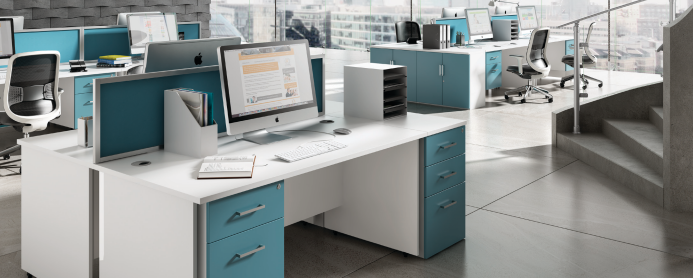Custom Office Furniture Tailored to Your Business Needs

In today’s fast-paced business environment, the right office furniture can make all the difference. It’s not just about aesthetics; well-chosen furniture can enhance productivity, improve employee well-being, and create a space that reflects your company’s culture. Here’s a look at the latest trends in office furniture and some tips for selecting the perfect pieces for your workspace.
1. Ergonomics Take Center Stage
As we spend more time seated at our desks, ergonomic furniture has become essential. Ergonomic chairs and desks are designed to support good posture, reduce strain, and prevent injuries. Features to look for include adjustable seat height, lumbar support, and a seat that promotes proper alignment. Standing desks and adjustable-height desks are also gaining popularity, offering flexibility to switch between sitting and standing throughout the day.
2. Multi-Functional Furniture
In modern offices, space is often at a premium. Multi-functional furniture is a great solution, offering versatility without sacrificing style. Desks with built-in storage, modular seating that can be reconfigured, and meeting tables that double as collaborative workspaces are all examples of how you can maximize utility and efficiency.
3. Sustainable and Eco-Friendly Materials
Sustainability is more than just a buzzword; it’s a growing movement in office design. Eco-friendly materials, such as recycled plastics, sustainable wood, and low-VOC finishes, are becoming increasingly common. Choosing sustainable furniture not only helps the environment but can also improve indoor air quality and contribute to a healthier workspace.
4. Personalized and Flexible Design
Gone are the days of one-size-fits-all office furniture. Today’s designs are all about personalization and flexibility. Customizable options allow you to tailor furniture to your specific needs and preferences. Modular furniture systems, adjustable components, and a range of color and fabric choices help create a workspace that reflects your unique style and enhances employee comfort.
5. Technology Integration
As technology continues to evolve, so does office furniture. Modern desks and workstations often come with built-in cable management systems, wireless charging pads, and integrated power outlets. This seamless integration ensures that technology supports your work rather than creating clutter and distractions.
6. Focus on Collaboration
The shift towards more collaborative work environments has led to an increase in furniture designed for teamwork. Collaborative workspaces often feature flexible seating arrangements, movable partitions, and communal tables. These elements encourage interaction and make it easier for teams to work together effectively.
Tips for Choosing Office Furniture
- Assess Your Needs: Consider the specific requirements of your team and the nature of their work. Different roles may require different types of furniture.
- Prioritize Comfort and Functionality: While style is important, functionality and comfort should be your top priorities. Test out chairs and desks before purchasing to ensure they meet ergonomic standards.
- Consider Space and Layout: Measure your office space and plan the layout to ensure that the furniture fits well and allows for easy movement. Use floor plans or design software to visualize the setup.
- Invest in Quality: Quality furniture may have a higher upfront cost, but it will often be more durable and cost-effective in the long run. Look for reputable brands and read reviews to ensure you’re making a good investment.
- Think About Aesthetics: Choose furniture that complements your office’s overall design and branding. The right pieces can create a cohesive look and set the tone for your workspace.
By staying informed about the latest trends and carefully considering your needs, you can create an office environment that enhances productivity, supports well-being, and makes a positive impression on clients and visitors.